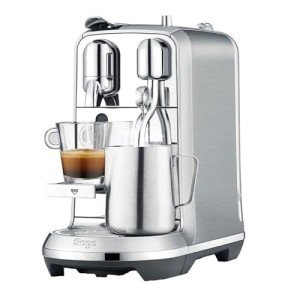The Secret Secrets Of Home Espresso Machines
The Rise of Home Espresso Machines: A Comprehensive Guide
As coffee lovers continue to look for fresh and tasty brews at home, the popularity of home espresso machines has surged in the last few years. No longer just the domain of coffee shops and coffee stores, these machines empower individuals to craft barista-quality espresso beverages from the convenience of their kitchen areas. This article will explore the numerous kinds of home espresso machines, their features, and considerations for selecting the ideal one. Additionally, it will offer a choice of FAQs to assist potential purchasers make informed choices.
Kinds Of Home Espresso Machines
Home espresso machines can be categorized into several categories based on their mechanisms and user-friendliness. Each type has its special features, pros, and cons.
Type
Description
Pros
Cons
Manual Espresso Machines
Needs the user to manually control the brewing procedure, including strategies like pulling a lever to create pressure.
- Complete control over brewing procedure
- Compact design
- Requires skill and practice
- Time-consuming
Semi-Automatic Machines
Machine automates water flow and pressure, but the user still manages the dosing and period of the brewing procedure.
- Balance of automation and control
- Versatile
- Learning curve for improving techniques
Totally Automatic Machines
Automates the whole developing process, from grinding to brewing, typically with programmable settings for tailored beverages.
- Extremely user-friendly
- Quick and practical
- Less control over the brewing process
- Higher price point
Pill or Pod Machines
Utilizes pre-packaged espresso capsules or pods to create coffee rapidly and quickly.
- Extremely simple to use
- Minimal clean-up
- Limited taste variety
- More pricey per cup than ground coffee
Super-Automatic Machines
Integrates features of fully automatic machines with integrated mills, permitting users to brew entire bean espresso and milk-based drinks with one touch.
- All-in-one benefit
- Ideal for milk-based drinks
- Often the most pricey
- Can be large
Features to Consider
When choosing a home espresso machine, possible buyers ought to consider the following functions to guarantee they select a machine that meets their requirements:
Grinder Type:
- Built-in mills can provide fresher grounds however may require more maintenance.
- Separate grinders permit more modification of grind size.
Pressure:
- Look for machines that produce a minimum of nine bars of pressure, which is ideal for developing espresso.
Water Temperature Control:
- Machines with adjustable temperature level settings enable much better extraction of flavor from beans.
Milk Frothing Options:
- Consider whether you desire a manual steam wand for frothing or an automatic milk frother for benefit.
Ease of Cleaning:
- Machines with detachable parts and self-cleaning functions significantly minimize cleanup time.
Size and Design:
- Ensure the machine fits easily in your kitchen and lines up with your visual choices.
Budget:
- Set a budget before beginning your search, as costs can vary substantially from affordable designs to high-end machines.
Benefits of Home Espresso Machines
Owning a home espresso machine offers numerous advantages:
- Cost-Effective: Over time, brewing espresso at home can save coffee enthusiasts money compared to regular coffee shop visits.
- Personalization: Users can explore different beans, grind sizes, and developing techniques to discover their ideal cup.
- Convenience: The capability to brew espresso any time gets rid of the need to go out to a café, especially helpful throughout late nights or early mornings.
- Quality assurance: With a home machine, people have total control over the quality of active ingredients and brewing procedures.
Drawbacks of Home Espresso Machines
Nevertheless, there are some downsides to think about:
- Initial Investment: High-quality espresso machines can be costly, requiring a substantial in advance investment.
- Learning Curve: Mastering the art of espresso brewing can take time and practice, which might be frightening for novices.
- Maintenance: Like any appliance, espresso machines require routine cleaning and maintenance to ensure ideal efficiency.
Frequently asked questions
1. What is the best type of home espresso machine for newbies?
Answer: For beginners, a semi-automatic machine is frequently suggested as it offers a balance between control and automation, permitting you to learn the basics without frustrating complexity.
2. Just how much should I invest in a home espresso machine?
Response: Entry-level machines can begin around ₤ 100 to ₤ 300, while higher-end designs can vary from ₤ 500 to over ₤ 2000. Buy Espresso Online to set a budget based upon your expected use and wanted features.
3. Do I need a separate grinder?
Response: While some espresso machines come with integrated mills, buying a different grinder enables higher personalization and ensures much better quality grounds.
4. How frequently should I clean my espresso machine?
Response: Cleaning frequency can vary by machine type, however it's usually suggested to clean the machine after each use and carry out deep cleanings weekly or month-to-month, depending upon usage.
5. Can I make milk-based beverages with any espresso machine?
Answer: Not all machines feature milk frothing abilities. If you take pleasure in beverages like lattes or cappuccinos, look for a machine with a steam wand or automatic frother.
Home espresso machines are transforming the method coffee enthusiasts enjoy their precious brews. With different types and advanced functions readily available in the market, there is something for everyone. Whether it's the pleasure of producing distinct dishes or merely savoring the ideal shot of espresso, purchasing a home espresso machine can enhance both the coffee-drinking experience and the lifestyle for coffee fans everywhere. Similar to any investment, it is crucial to weigh the advantages versus the prospective downsides and select a machine that effortlessly fits both your way of life and preferences.
